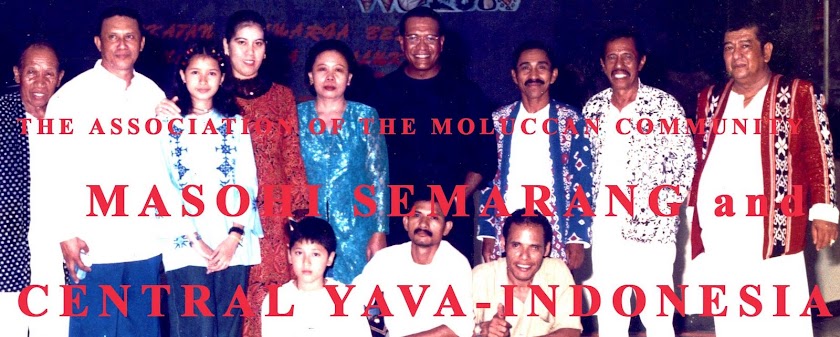Employees called Trading is the migrants, both because of wedlock with Children Affairs, and as the tasks of the community (teachers, registered nurse, orderly agriculture, and others), or because of economic activity (productive land or forest product collector, or traders). So, people in a State Trading, can be derived from the Maluku native who came from other State, or immigrants from outside Maluku, which is derived from Buton, and ethnic Chinese and Arabic.
Gotong Royong
Special immigrants from outside Maluku, the dominant ethnic group in terms of quantity is enis Buton. Trading people from outside Maluku to come and settle in the State, either berbaur with Children Affairs and a communal Petuanan State in the other, more dominated by economic interests. Trading of people who come from the descendants of Arabic or Chinese, come and occupy a State of the amount is very small, namely only one or a few families. They present this as traders who do not establish a separate communal from the Children's Affairs, but in the community berbaur Children Affairs. Social contact between the State Children from two or more State, occurred because of kinship relations, which terakomodasi in many different forms, including trained and Gandong, or because the relationship of economic and social others, such as children's education, or religious events and days great statesman. Conversely, social contact between the child with the State Employees Trade, which mainly came from outside Maluku, occurred because of the economic activities, so that the pattern of relationship the two groups of people is more motivated by economic interests only.
In antropologis and the sociological, then in the social life, especially in rural areas in Central Maluku, there are three of the community, namely Children's Affairs Sarani, a Children's Affairs, Trade and People. Adhesives one social group among the other groups, different. Social glue that binds social relationships Sarani Children's Affairs and Children Affairs Salam, among other prominent is the cultural values or trained Gandong believed to have the strength Supernatural, which greatly affect the social behavior of this second group of people. Bound culture exists in practice is visible from the nature of cooperativeness between the two Affairs related Impleme or gandong. The nature of cooperativeness this reality in the area of identity to enter sensitive groups, namely the construction of houses of worship, where the State Sarani feel obliged to prepare the material (usually wood) and together build a mosque. However, the State Peace feel obliged to prepare building materials and together build the church.
Anak Negeri ini, terdiri atas dua kelompok pemeluk agama, yaitu Anak Negeri Sarani untuk yang beragama Kristen, yang mendiami Negeri (Desa Adat) Sarani, dan Anak Negeri Salam untuk yang beragama Islam, yang mendiami Negeri (Desa Adat). Kedua kelompok masyarakat ini umumnya hidup dalam komunal-komunal (Negeri) yang terpisah, kecuali di beberapa desa seperti Hila, Larike dan Tial di Pulau Ambon.
Yang disebut Orang Dagang ialah para pendatang, baik karena ikatan perkawinan dengan Anak Negeri, maupun karena tugas-tugas pelayanan masyarakat (guru, mantri kesehatan, mantri pertanian, dan lain-lain), atau karena aktivitas ekonomi (penggarap tanah atau pemungut hasil hutan, atau pedagang). Jadi, Orang Dagang di sebuah Negeri, dapat berasal dari orang Maluku asli yang berasal dari Negeri lain, ataupun pendatang dari luar Maluku, yaitu yang berasal dari Buton, dan suku bangsa Cina serta Arab.
Gotong Royong
Khusus pendatang dari luar Maluku, etnis yang dominan dari segi kuantitas ialah enis Buton. Orang Dagang dari luar Maluku ini datang dan menetap dalam Negeri, baik secara berbaur dengan Anak Negeri maupun membentuk suatu komunal lain dalam Petuanan Negeri, lebih didominasi oleh kepentingan ekonomi. Orang Dagang yang berasal dari keturunan Arab atau Cina, datang dan mendiami sebuah Negeri dalam jumlah yang sangat kecil, yaitu hanya satu atau beberapa kepala keluarga. Mereka ini hadir sebagai pedagang yang tidak membentuk komunal yang terpisah dari Anak Negeri, tetapi berbaur dalam komunitas Anak Negeri. Kontak sosial antar Anak Negeri dari dua atau lebih Negeri, terjadi karena hubungan kekerabatan, yang terakomodasi dalam berbagai wujud termasuk Pela dan Gandong, atau karena hubungan ekonomi maupun sosial lain, seperti pendidikan anak, atau acara-acara keagamaan maupun hari-hari besar kenegaraan. Sebaliknya, kontak sosial antara Anak Negeri dengan Orang Dagang, terutama yang berasal dari luar Maluku, terjadi karena kegiatan ekonomi, sehingga pola hubungan kedua kelompok masyarakat ini lebih dimotivasi oleh kepentingan ekonomi semata.
Secara antropologis dan sosiologis tersebut, maka sesungguhnya dalam kehidupan sosial, terutama pada daerah pedesaan di Maluku Tengah, terdapat tiga pengelompokan masyarakat, yaitu Anak Negeri Sarani, Anak Negeri Salam, dan Orang Dagang. Perekat sosial antar satu kelompok dengan kelompok lainnya, berbeda-beda. Perekat sosial yang mengikat hubungan sosial Anak Negeri Sarani dan Anak Negeri Salam, antara lain yang menonjol ialah nilai-nilai budaya Pela atau Gandong yang diyakini mempunyai kekuatan supranatural yang sangat mempengaruhi perilaku sosial kedua kelompok masyarakat ini. Wujud keterikatan budaya ini secara praktis terlihat dari sifat kegotong-royongan antar kedua Negeri yang mempunyai hubungan pela atau gandong. Sifat kegotong-royongan ini dalam realitasnya memasuki area identitas kelompok yang sensitif, yaitu dalam hal pembangunan rumah ibadah, dimana Negeri Sarani merasa wajib untuk menyiapkan bahan bangunan (biasanya kayu) dan bersama-sama membangun mesjid. Demikian sebaliknya, Negeri Salam merasa wajib untuk menyiapkan bahan bangunan dan bersama-sama membangun gereja.























0 komentar:
Post a Comment